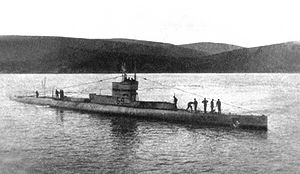HMS G11

A G-class submarine before bow modification.
|
|
| History | |
|---|---|
|
|
|
| Name: | HMS G11 |
| Builder: | Vickers, Barrow in Furness |
| Laid down: | 28 March 1915 |
| Launched: | 22 February 1916 |
| Commissioned: | 13 May 1916 |
| Fate: |
Wrecked off Howick, Northumberland, 22 November 1918 NU261176 |
| General characteristics | |
| Class and type: | G-class submarine |
| Displacement: |
|
| Length: | 188 ft 8 in (57.51 m) |
| Beam: | 22 ft 8 in (6.91 m) |
| Draught: | 13 ft 7 in (4.14 m) |
| Installed power: |
|
| Propulsion: |
|
| Speed: |
|
| Range: |
|
| Capacity: | 44.14 long tons (44.85 t) diesel fuel |
| Complement: | 31 |
| Armament: | 1 × 3 in (76 mm) gun, 1 × 12-pounder gun, 4 × 18-inch (450-mm) torpedo tubes (2 bow, 2 beam), 1 × stern 21 inch torpedo tube (10 torpedoes, all tubes combined) |
Wrecked off Howick, Northumberland, 22 November 1918
HMS G11 was a G-class submarine of the Royal Navy in service during the First World War. One of six of her class built by Vickers at Barrow in Furness, she was launched on 22 February 1916, and commissioned on 13 May 1916.
The G-class submarines were designed by the Admiralty in response to a rumour that the Germans were building double-hulled submarines for overseas duties. The submarines had a length of 187 feet 1 inch (57.0 m) overall, a beam of 22 feet 8 inches (6.9 m) and a mean draft of 13 feet 4 inches (4.1 m). They displaced 703 long tons (714 t) on the surface and 837 long tons (850 t) submerged. The G-class submarines had a crew of 30 officers and other ranks. They had a partial double hull.
For surface running, the boats were powered by two 800-brake-horsepower (597 kW) Vickers two-stroke diesel engines, each driving one propeller shaft. When submerged each propeller was driven by a 420-horsepower (313 kW) electric motor. They could reach 14.25 knots (26.39 km/h; 16.40 mph) on the surface and 9 knots (17 km/h; 10 mph) underwater. On the surface, the G class had a range of 2,400 nautical miles (4,400 km; 2,800 mi) at 16 knots (30 km/h; 18 mph).
...
Wikipedia
